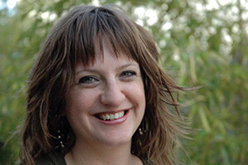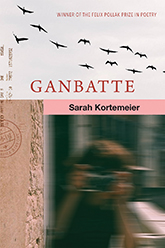|
Ganbatte
Sarah Kortemeier
Wisconsin Poetry Series
Ronald Wallace and Sean Bishop, Series Editors
Winner of the Felix Pollak Prize in Poetry, selected by Carl Phillips
“The poems of Ganbatte use language to give us what photography can’t, always: a sense of the interior, of the sensibility of place and of what has happened there—story and history, Hansel and Gretel and the Holocaust and Hiroshima. Here 'language / has two mouths. / One for speech one for sound.’ Speech has the power to transform, if not erase, and the sentence becomes a powerful map that refuses to stop asking: Where are we, how did we get here?”
—Carl Phillips, contest judge
Ganbatte is a Japanese word that means “do your best.” In this vivid debut collection, Sarah Kortemeier wrestles with striving to meet this goal. Shifting between continents, languages, and remembered violences, she explores what it means to experience history as a tourist. She also asks how the grandchildren of those who fought in World War II move forward with the burdens of the past. Refusing to offer easy answers, Ganbatte reveals life overseas in flashes and jagged bursts of memory, minute collages observing moments of humor, loneliness, friendship, and grief from the mundane (how to distinguish parsley from cilantro in a Japanese grocery store) to the existentially overwhelming (how do we, as a species, cope with global trauma?). These formally diverse poems advocate for openness and curiosity as habits of mind when confronting personal and collective struggle.
Journeys penetrate. Afterward, song
and the stench of burning from things
we thought were private.
—excerpt from “ὁδός [hodos]”
 Sarah Kortemeier is library director at the University of Arizona Poetry Center. Her work has appeared in Alaska Quarterly Review, the Feminist Wire, and Ploughshares.
Sarah Kortemeier is library director at the University of Arizona Poetry Center. Her work has appeared in Alaska Quarterly Review, the Feminist Wire, and Ploughshares.
Praise
“ ‘When I speak, I transform,’ Sarah Kortemeier writes, and indeed Ganbatte is as much about translating the self as it is about language, as much about interior shifts as literal travel. As a father is overheard telling a child, ‘If you want to be carried, use / your words.’ ”
—Maggie Smith
“A deeply moving debut. These are poems of witness—by the outsider who, while learning new languages and cultural practices, registers the ongoing reverberations of two cataclysms: Hiroshima and Auschwitz. Ganbatte is a book of aftermath, a book of urgent relevance to those with eyes open to our century’s current human upheavals.”
—Boyer Rickel
|

Larger images
November 2019
LC: 2019008581 PS
96 pp. 6 x 9
|

